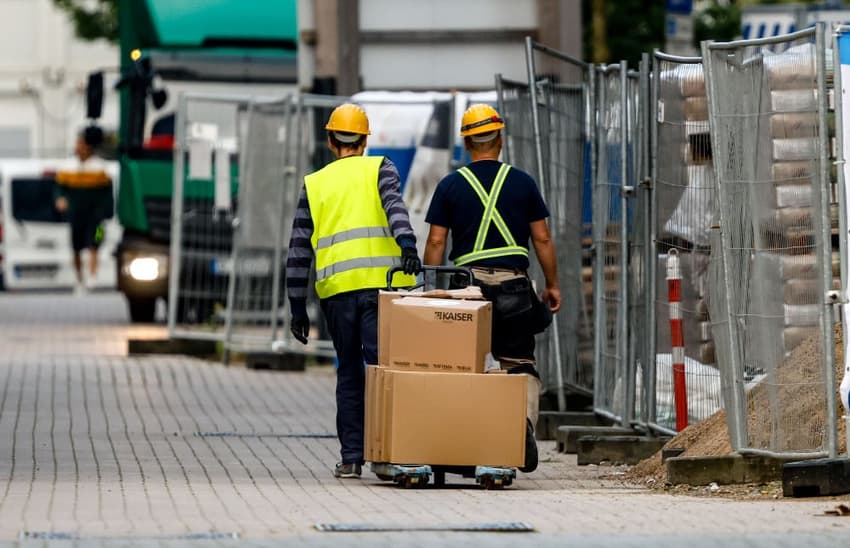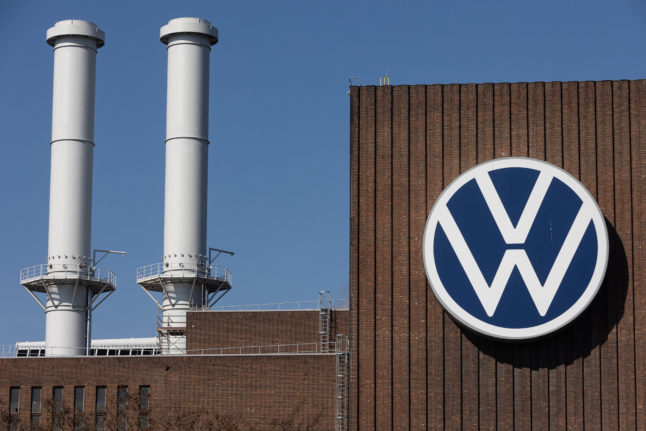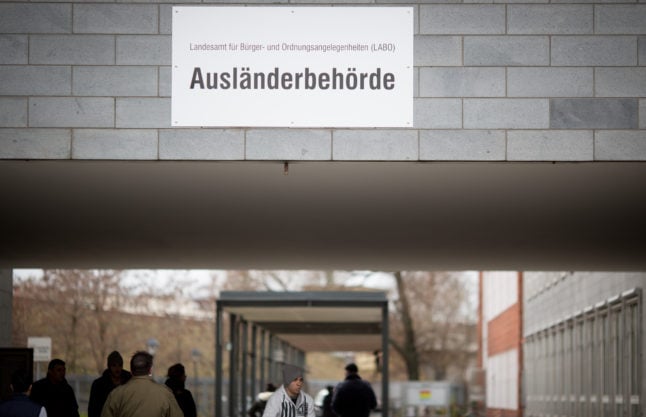OPINION: Is Germany really the sick man of Europe?

Is Germany's economy really going down the drain, or is the country falling victim to a self-fulfilling prophesy that can still be reversed? There's reason to hope for the latter, writes Brian Melican.
For those of us who have a rapidly-approaching rendezvous with the Big 4-0, 2023 is proving to be a soothingly nostalgic year. Summer has been a pre-climate-change style wash-out, girls are back wearing crop-tops and cargoes like Britney Spears in her heyday, and – with social-media fatigue widespread – it’s once again socially acceptable to send text messages and not care about the latest hashtag-driven campaign.
It’s like being in my late teens again, but with less acne and more money. Hell, even the news is like it was 20 years ago: according to The Economist, Germany is, a quarter of a century on from the paper’s original use of the metaphor, once again ‘The Sick Man of Europe’ and Deutschlandfunk’s morning programme is now more or less entirely devoted to how German industry, once the pride of the nation, is going down the pan.
If you’re younger than me, yet still have a distinct sense of déjà-vu, that’s because there is also a shorter cycle of repetition in play: for the third time in three years, German public discourse is suffering a nervous breakdown. First, it was Covid that drove us round the bend; then the Ukraine War had us terrified; now, we’re obsessing about the state of the economy.

Carmakers like VW are part of the core of Germany's industry. Photo: Yann Schreiber / AFP
Don’t get me wrong: all of these crises were (Covid) or still are (Ukraine and economy) serious. Yet the famed German angst and our national tendency to doom-spiral thought patterns mean that they seem even worse here – and, more worryingly, that we are, as a polity, in danger of becoming too depressed to take action.
This is especially difficult because, with the economy, we are facing a crisis mainly of our own making – and so one that only we can solve. Covid was force majeure and knocked everyone for six; the Russian assault on the Ukraine is one we played an unfortunate role in enabling and for which we were ill-prepared, but which has wreaked havoc globally.
Economically, however, we spent the 2010s singularly failing to ready ourselves for the future and so are now watching as countries with a lower reliance on legacy fossil-fuelled business models and better digital infrastructure pull ahead: not just the US, but France, Spain, and even Italy are outpacing us. The only other Western country facing the same stagnation is post-Brexit Britain.
Economists can describe in great detail why Germany will find it difficult to up output over the next few years, but essentially, it’s a lack of three things and an excess of one. Since the introduction of the famed Schuldenbremse (the ‘debt-brake’ to prevent excessive government borrowing) in 2009, there has been a chronic lack of state investment in basic infrastructure – witness the collapsing rail network and crumbling autobahns.
Meanwhile, as Germany’s population ages and the remaining workforce goes part-time, we are facing an increasing lack of labour. Immigration, once thought the magic bullet, has done little to change this because highly-qualified newcomers often leave again after a few years and our track-record in integrating low-skilled migrants into the economy is patchy at best.
Now, these twin chronic issues have been joined by an acute lack of energy as Russian gas has disappeared, replacement supplies have proven pricey, and we – in an act of national lunacy – have turned off our three remaining nuclear power plants. The one thing that Germany has an excess of, meanwhile, is generally considered bad for growth: red tape.

The entrance to the Foreigner's Office (Ausländerbehörde), which has become a symbol of red tape in Germany - in Berlin. Photo: picture alliance / Kay Nietfeld/dpa | Kay Nietfeld
Yet none of these issues is exclusive to Germany. Years of insufficient investment infrastructure? Ireland’s rail and road network is incomplete and, in places, painfully slow, yet the Celtic Tiger has reawakened. Shrinking population? Spain is growing at 2 percent annually despite worse demographics than ours. Expensive energy? Austria has been just as badly hit and isn’t in a national funk.
Part of our issue is that, as a country, our expectations are sky-high. Germany is never content with being just another well-off Western country muddling through: we always have to be the World’s Best, and whether the discipline is industry, healthcare, or football, when we find out we aren’t, we lose heart – and lose the ability to see what we still have going for us.
As such, we now have the executives of major German industrials writing off the country behind their success to date and threatening to take investment elsewhere. And indeed, if they buy into the idea that we as a country are finished and do stop investing here, then we really will be in trouble. It’s a self-fulfilling prophecy.
So what is to be done? Germany beat its turn-of-the-millennium blues with an ambitious programme of reforms called Agenda 2010, and there are now calls for an Agenda 2030.
I agree that something eye-catching of the sort is needed to restore business confidence and show we are serious, but without the social welfare carnage unleashed back then which created an underclass for the sake of balancing the books.
In fact, quite to the contrary, Germany needs to invest, both in its infrastructure and its people. Last Wednesday’s government announcement contains a raft of measures headed in this direction, yet much of the package is actually just existing policy now clumsily comm-sed as the “Growth potential act” and “Future financing” acts.
No, we need a bigger bang. Here are three things I’d do. To invest sufficiently without resorting to short-sighted borrow-and-spend, I think we should, first, axe the billions of subsidies we lavish every year on dinosaur diesel vehicles.
We could then, second, use the savings to fund measures which would increase our future economic capacity.
Thirdly, we should create a top-brass commission with a simple task: to sit down and read through Germany’s reams of laws, ordinances, and regulations, both at federal and state level, and ask themselves three simple questions: Do we actually understand what is written? Is it at odds with other provisions or even self-contradictory? And does it help us to streamline and decarbonise our economy? Anything which fails these tests should be reworked or binned.
We could call this trio Agenda 2030-3 or something equally catchy – or come up with something else. Whatever we do, though, we will need the same kind of ambition, appetite for change, and willingness to take a few calculated risks in the face of naysayers and status-quo lobbyists that we showed in the early 2000s. As I said, in fashion terms at least, those years are currently experiencing a revival...
Comments
See Also
For those of us who have a rapidly-approaching rendezvous with the Big 4-0, 2023 is proving to be a soothingly nostalgic year. Summer has been a pre-climate-change style wash-out, girls are back wearing crop-tops and cargoes like Britney Spears in her heyday, and – with social-media fatigue widespread – it’s once again socially acceptable to send text messages and not care about the latest hashtag-driven campaign.
It’s like being in my late teens again, but with less acne and more money. Hell, even the news is like it was 20 years ago: according to The Economist, Germany is, a quarter of a century on from the paper’s original use of the metaphor, once again ‘The Sick Man of Europe’ and Deutschlandfunk’s morning programme is now more or less entirely devoted to how German industry, once the pride of the nation, is going down the pan.
If you’re younger than me, yet still have a distinct sense of déjà-vu, that’s because there is also a shorter cycle of repetition in play: for the third time in three years, German public discourse is suffering a nervous breakdown. First, it was Covid that drove us round the bend; then the Ukraine War had us terrified; now, we’re obsessing about the state of the economy.

Don’t get me wrong: all of these crises were (Covid) or still are (Ukraine and economy) serious. Yet the famed German angst and our national tendency to doom-spiral thought patterns mean that they seem even worse here – and, more worryingly, that we are, as a polity, in danger of becoming too depressed to take action.
This is especially difficult because, with the economy, we are facing a crisis mainly of our own making – and so one that only we can solve. Covid was force majeure and knocked everyone for six; the Russian assault on the Ukraine is one we played an unfortunate role in enabling and for which we were ill-prepared, but which has wreaked havoc globally.
Economically, however, we spent the 2010s singularly failing to ready ourselves for the future and so are now watching as countries with a lower reliance on legacy fossil-fuelled business models and better digital infrastructure pull ahead: not just the US, but France, Spain, and even Italy are outpacing us. The only other Western country facing the same stagnation is post-Brexit Britain.
Economists can describe in great detail why Germany will find it difficult to up output over the next few years, but essentially, it’s a lack of three things and an excess of one. Since the introduction of the famed Schuldenbremse (the ‘debt-brake’ to prevent excessive government borrowing) in 2009, there has been a chronic lack of state investment in basic infrastructure – witness the collapsing rail network and crumbling autobahns.
Meanwhile, as Germany’s population ages and the remaining workforce goes part-time, we are facing an increasing lack of labour. Immigration, once thought the magic bullet, has done little to change this because highly-qualified newcomers often leave again after a few years and our track-record in integrating low-skilled migrants into the economy is patchy at best.
Now, these twin chronic issues have been joined by an acute lack of energy as Russian gas has disappeared, replacement supplies have proven pricey, and we – in an act of national lunacy – have turned off our three remaining nuclear power plants. The one thing that Germany has an excess of, meanwhile, is generally considered bad for growth: red tape.

Yet none of these issues is exclusive to Germany. Years of insufficient investment infrastructure? Ireland’s rail and road network is incomplete and, in places, painfully slow, yet the Celtic Tiger has reawakened. Shrinking population? Spain is growing at 2 percent annually despite worse demographics than ours. Expensive energy? Austria has been just as badly hit and isn’t in a national funk.
Part of our issue is that, as a country, our expectations are sky-high. Germany is never content with being just another well-off Western country muddling through: we always have to be the World’s Best, and whether the discipline is industry, healthcare, or football, when we find out we aren’t, we lose heart – and lose the ability to see what we still have going for us.
As such, we now have the executives of major German industrials writing off the country behind their success to date and threatening to take investment elsewhere. And indeed, if they buy into the idea that we as a country are finished and do stop investing here, then we really will be in trouble. It’s a self-fulfilling prophecy.
So what is to be done? Germany beat its turn-of-the-millennium blues with an ambitious programme of reforms called Agenda 2010, and there are now calls for an Agenda 2030.
I agree that something eye-catching of the sort is needed to restore business confidence and show we are serious, but without the social welfare carnage unleashed back then which created an underclass for the sake of balancing the books.
In fact, quite to the contrary, Germany needs to invest, both in its infrastructure and its people. Last Wednesday’s government announcement contains a raft of measures headed in this direction, yet much of the package is actually just existing policy now clumsily comm-sed as the “Growth potential act” and “Future financing” acts.
No, we need a bigger bang. Here are three things I’d do. To invest sufficiently without resorting to short-sighted borrow-and-spend, I think we should, first, axe the billions of subsidies we lavish every year on dinosaur diesel vehicles.
We could then, second, use the savings to fund measures which would increase our future economic capacity.
Thirdly, we should create a top-brass commission with a simple task: to sit down and read through Germany’s reams of laws, ordinances, and regulations, both at federal and state level, and ask themselves three simple questions: Do we actually understand what is written? Is it at odds with other provisions or even self-contradictory? And does it help us to streamline and decarbonise our economy? Anything which fails these tests should be reworked or binned.
We could call this trio Agenda 2030-3 or something equally catchy – or come up with something else. Whatever we do, though, we will need the same kind of ambition, appetite for change, and willingness to take a few calculated risks in the face of naysayers and status-quo lobbyists that we showed in the early 2000s. As I said, in fashion terms at least, those years are currently experiencing a revival...
Join the conversation in our comments section below. Share your own views and experience and if you have a question or suggestion for our journalists then email us at [email protected].
Please keep comments civil, constructive and on topic – and make sure to read our terms of use before getting involved.
Please log in here to leave a comment.